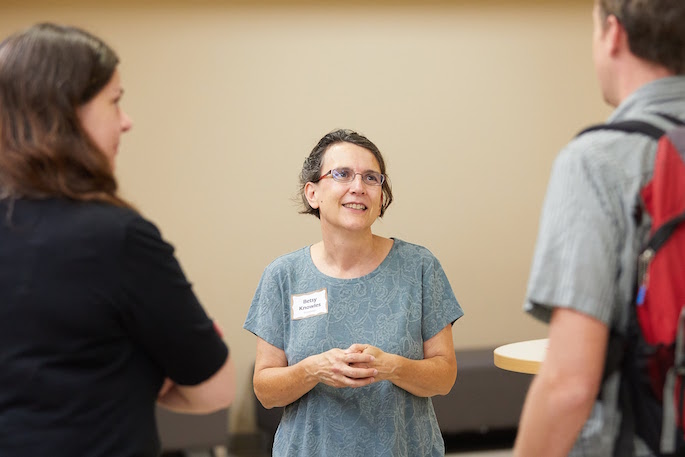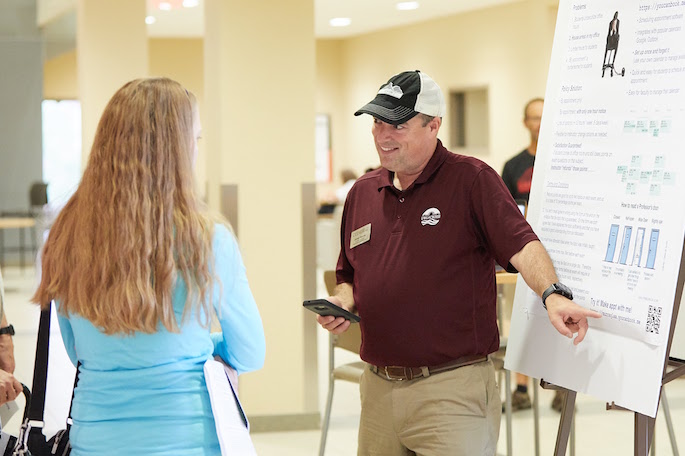Posted 9:31 a.m. Thursday, Aug. 31, 2017

Five tips for instructors to improve the first-year student experience from annual conference.
Five tips for instructors to improve the first-year student experience from annual conference
This Tuesday, Sept. 5 many UW-La Crosse students will be sitting in a college classroom for the first time. They’ll read their first syllabus and complete their first college assignment. This will lead to some of the first feedback they receive about how they’re doing in their new life away from home. Seemingly small details such as the words instructors use when giving feedback on papers can make a big difference for these first-year students — even impacting feelings about belonging in college, says Tim Dale, chair of the UWL Political Science Department and co-director of UWL’s Reimagining the First Year project. “The same time that your encouragement can build a student up, your discouragement can do a lot of damage in one second,” explained Dale to a Centennial Hall room filled with UWL instructors on Tuesday. Dale explained some of the latest research related to instructor feedback, as well as other best practices for working with first-year students transitioning into college during the 19th Annual UWL Conference on Teaching & Learning, Tuesday, Aug. 29, in Centennial Hall. More than 45 faculty and staff presented 20 posters and eight concurrent sessions on a broad range of teaching and learning topics. Dale’s was one of three presentations featured as part of a track of sessions focused on supporting success of first-year students, designed in conjunction with UWL’s campus-wide initiative to Re-imagine the First-Year of College. Although intended to develop better instruction for first-year college students, the topics were applicable to instruction across all years of college, explains Bill Cerbin, director of UWL’s Center for Advancing Teaching and Learning. [caption id="attachment_49649" align="alignnone" width="685"] Another session focused on first-year students was on "Cultivating a Growth Mindset." Betsy Knowles, Economics, pictured here, as well as Tesia Marshik, Psychology, and Nathan Warnberg, Mathematics, gave the presentation.[/caption]
First-year students are a vulnerable population when it comes to retention. Although UWL has a high retention rate overall — the percentage of fall 2015 students who returned in fall 2016 was 86 percent — there is room for improvement, says Cerbin.
Dale offered many tips for instructors during his session to improve learning for first-year students, and, ultimately, help more students know they belong at UWL. Here are five.
Another session focused on first-year students was on "Cultivating a Growth Mindset." Betsy Knowles, Economics, pictured here, as well as Tesia Marshik, Psychology, and Nathan Warnberg, Mathematics, gave the presentation.[/caption]
First-year students are a vulnerable population when it comes to retention. Although UWL has a high retention rate overall — the percentage of fall 2015 students who returned in fall 2016 was 86 percent — there is room for improvement, says Cerbin.
Dale offered many tips for instructors during his session to improve learning for first-year students, and, ultimately, help more students know they belong at UWL. Here are five.
1.Give feedback that gets results
Little tweaks in instructors’ style such as giving reassuring feedback on an assignment that received a poor grade can be the difference between a student redoing the assignment or not, according to recent research on student learning, called Wise Feedback. It can also impact a student’s sense of belonging in college. Dale explained the study where first-year students who received poor grades on an essay were each given a slip of paper with a note from the professor clipped to the essay. Some students were given this note, “I’m giving you these comments because I have high standards and know you can meet them.” A comparison group of students was given this statement on the slip, “I’m giving you these comments so you have feedback on your essay.” The group that was told about the high standards and given assurance were much more likely to redo the assignment and also increased the quality of the rewritten paper. This kind of reassuring feedback particularly made a difference for underrepresented students. For instance, 72 percent of African American students revised the essay when they received the reassuring words compared with only 17 percent revising the paper in the comparison group. Among white students, 87 percent revised it with reassuring feedback and 62 percent revised it without. Dale says these results have bigger implications as students can sometimes internalize feedback on a particular assignment — not as a commentary on the assignment but on their ability to succeed in college in general.2. Repeat this mantra regularly
Not only written assignment feedback is important. Students also need to hear from instructors — particularly this message, “This is normal and it gets better,” explains Dale. Aome instructors make this a regular mantra in the classroom, says Dale. That’s because when students arrive at college for the first time they ask themselves two main questions: Is this normal? Does it get better? Previous research has shown that when students answer “no” to both of those questions, they are more likely to leave college, explains Dale. How they can potentially answer “yes” to those questions is to have people reassure them that “this is normal and it gets better,” he adds. UWL is currently conducting research on whether efforts to provide that reassurance to students works. A video was recently distributed to first-year students via email featuring current students sharing their experience transitioning to college and providing examples of how it is normal and gets better.3. Don’t be secretive about expectations
Dale says for an assignment to be effective it should be “rigorous” but not “difficult.” Difficult means the way the assignment is presented is hard to understand, leading to confusion about what is expected. When instructors are clear about what they expect from students in the syllabus and when assigning work, this does not take away from the rigor of the assignment, says Dale. Instead, rigor — or the amount of learning a student has to do — can arguably more easily occur if students clearly understand what is expected. This includes the student understanding what the learning outcomes of the assignment are from the outset instead of explaining it after assignments are turned in or graded. “One of the issues that some people have with making this kind of accommodation is the fear that class becomes less rigorous,” says Dale. “But instructors need to keep in mind the difference between an assignment being rigorous versus an assignment being difficult.”4. Think out loud
Dale shared a teaching strategy developed by Sam Wineburg, professor of education and history at Stanford, "Think-aloud." Wineburg recommends that teachers read passages and solve problems while communicating everything that they are thinking while they do it. This helps expose students to all of the thoughts, processes, doubts, and theories that are working in the background while instructors teach and learn in their disciplines. For instance, a math professor could solve an unrehearsed problem on the board while taking about it. In a political science class, Dale might do this by showing students how he checks historical facts while theorizing about the relationship between Congress and the President. This is one way students can see the way theories are formed and tested.5. Take time on the syllabus
Many instructors start the semester eager to get to the content they need to cover — sometimes handing out the syllabus without any discussion. Dale urges instructors to spend a day going over the syllabus. Research has shown when students know more about the purpose of a course and why it matters, they do better in it, he says. A discussion of the syllabus should include describing the course, describing the learning outcomes, going over assignments and due dates, as well as the rationale for the assignments.Bonus tip: Maximize office hours
[caption id="attachment_49653" align="alignnone" width="685"] James Murray, Economics, shared a poster on “Office Hours Satisfaction Guaranteed! Maximizing Student Learning and Satisfaction while Respecting Instructors' Time.”[/caption]
At the conference, many instructors offered ideas to improve teaching and learning. James Murray, Economics, outlined an office hours strategy that “respects instructors' time and need for flexibility while simultaneously maximizing instructors' availability and usefulness to students.” It also gives students more incentive and confidence to take advantage of office hours, explains Murray. The strategy uses an online scheduling tool that is easy for students to use and seamlessly integrates into instructors' calendars. The strategy involves a satisfaction guarantee to students where the instructor issues "refunds" to students should they come to office hours and still lose points on their exam. He discussed strategies to set up such a guarantee so that it is not abused and it does not inflate grades.
For future workshops and other opportunities to improve teaching and learning, visit the UWL Center for Advancing Teaching and Learning website.
James Murray, Economics, shared a poster on “Office Hours Satisfaction Guaranteed! Maximizing Student Learning and Satisfaction while Respecting Instructors' Time.”[/caption]
At the conference, many instructors offered ideas to improve teaching and learning. James Murray, Economics, outlined an office hours strategy that “respects instructors' time and need for flexibility while simultaneously maximizing instructors' availability and usefulness to students.” It also gives students more incentive and confidence to take advantage of office hours, explains Murray. The strategy uses an online scheduling tool that is easy for students to use and seamlessly integrates into instructors' calendars. The strategy involves a satisfaction guarantee to students where the instructor issues "refunds" to students should they come to office hours and still lose points on their exam. He discussed strategies to set up such a guarantee so that it is not abused and it does not inflate grades.
For future workshops and other opportunities to improve teaching and learning, visit the UWL Center for Advancing Teaching and Learning website.
